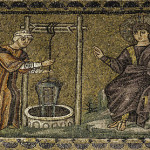We run our website the way we wished the whole internet worked: we provide high quality original content with no ads. We are funded solely by your direct support. Please consider supporting this project.

Christ the Center
The center of the Christian faith is not anything we believe; it’s the person of Jesus Christ. The foundation of my faith is a person, not a book and a set of beliefs about that book. Rather than believing in Jesus because I believe the Bible to be the inspired Word of God, I came to believe that the Bible is the inspired Word of God because I first believed in Jesus.
Whereas Islam has always presented itself as a “religion of the book,” the kingdom of God has been from the start a movement that is centered on a person. The only foundation that can be laid, Paul says, for example, is “the one already laid, which is Jesus Christ (1 Cor 3:11). Peter also referred to Jesus as the “cornerstone” (1 Pet 2:6).
While the earliest disciples believed the Old Testament was inspired, they never based their faith in Christ on this. They used it extensively, but only as a means of pointing people to Jesus, whom they already believed in for other reasons. This is the role the Bible should play in our lives.
But, in contrast to many, I do not think the Bible can bear the weight, nor was it ever intended by God to bear the weight, of being the foundation for why we believe in Jesus.
Instead, our belief in Jesus is the basis for belief in the inspiration of Scripture. On the basis of historical, philosophical, personal, and spiritual considerations, I believe that Jesus is the definitive revelation of God (See Lord or Legend for more on this). Yet the identity of Jesus is inextricably wrapped up in the Scriptures. He is the center and culminating point of the narrative. It’s actually impossible to understand who Jesus is apart from this story.
As a part of this story, Jesus promised that he would be present in his corporate body by the power of the Spirit to continue to guide it (Matt 28:20; Jon 14). And under his spiritual guidance, the community he dwelled among quickly came to acknowledge that both the Old and New Testaments were “God breathed” (1 Tim 3:16). As a part of this community, therefore, I feel compelled to submit to this discernment.
My faith in Christ therefore compels me to embrace all of Scripture as the inspired Word of God. It seems unfaithful to Christ, as well as to his corporate body, to do otherwise. I trust the Bible because of the endorsement by Christ of the Bible. Even though I have many other reasons to support this trust, they are all much less important by comparison.
It is primarily on the authority of Jesus that I rest my conviction regarding the inspiration of Scripture. Christ is the center, and my beliefs are secondary to that center.
Hence, I don’t see beliefs rooted in Scripture as an end in and of themselves. They rather point us to Jesus and help bring us into, and strengthen us in, our relationship with Jesus. The moment we begin to think that Scripture or our beliefs are ends in and of themselves, we are in danger of making an idol of Scripture and our beliefs.
Knowing Jesus Christ is the end to which all beliefs point. This relationship is what gives significance to everything we believe. This center is the one and only source of the life that is the heartbeat of the kingdom to which we belong.
—Adapted from Benefit of the Doubt, pages 159-170
Photo credit: Thomas Hawk via Visual hunt / CC BY-NC
Related Reading

God is Different Than You Think
The revelation of “[a] God humiliated even unto the cross,” as Pascal put it, flies in the face of what most Jews of Jesus’ time, and of what most people throughout history, have expected God to be. In this light, we can discern the thematic centrality of the cross in Jesus’ many teachings that reverse…

Paul Teaches Free Will, Not Determinism: Romans 9, Part 3
In this series of posts, I am challenging the deterministic reading of Romans 9, which interprets Paul’s teaching as saying that God chooses some to be saved and others to be damned. There are six arguments that I offer to challenge this popular view. Today, I will look at the fourth. Argument #4: Paul’s Summary and…

N.T. Wright on the Whole Sweep of Scripture
Here’s a really fine video message from N.T. Wright on how to read Scripture. So many of the misunderstandings we take away from Scripture happen when we pick out a verse here and there and neglect the whole story. We hope this will bless you and encourage you to “press your nose against the window.”

Why Bart Ehrman Doesn’t Have to Ruin Your Christmas (Or Your Faith) Part 2
This is the second of several videos Greg put together to refute Bart Ehrman’s claims published in the article What Do We Really Know About Jesus? If you missed it, you can catch the first installment here.

How Details in the Gospels Support Their Historicity
*This essay is adapted from G. Boyd & P. Eddy, Lord or Legend? (Baker, 2007). For a fuller discussion, see P. Eddy & G. Boyd, The Jesus Legend (Baker, 2007). There are a number of questions historians ask when they are trying to assess the historical value of an ancient document that claims to report…

Typhoon Haiyan and “Natural” Evil
Greg recorded his thoughts a few days ago on Typhoon Haiyan and the reality of “natural” evil that’s not really natural at all. “This an enemy has done.” (Matthew 13:28)
